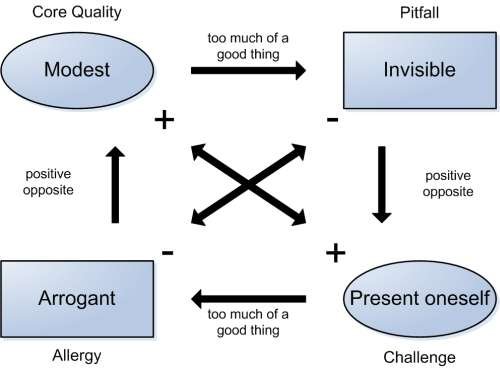You are viewing a single comment's thread from:
RE: Moving between absolute thrills and deadly boredom - sounds familiar? Then you might need a little exercise in finding middle ground - a nice resolution for 2018.
Hi, very interesting, never heard of the square of values before. I'm training to become an art therapist (based on ACT & artistic practise), and in my sessions I use the 'core quadrant' developed by Daniel Ofman, which seems somewhat similar. Was wondering if you know about that, it might even be more helpful to think about qualities and values...
Here an example. The interesting thing about is, is that often your quality is triggered by noticing an allergy in someone else... but that person's allergy might be a value/quality for them... which is very similar in what you describe above, how something that might seem negative is actually leading you to a positive quality...

Thanks for this interesting comment. I'll come back to you tomorrow. Having a blast with my family and just didn't want to leave you without a reply. See you tomorrow! :-)
edit:
thank you. I never heard of Daniel Ofman - this concept is very similar to the Schulz von Thun one.
Both try to emphasize that balance is important and once you identified the qualities you come to the exaggeration (allergy) of them. I like the logic of both. Also it is easy to work with them in my profession.
I would like to add to both concepts that dealing with identifications is somehow also a trap. In the Buddhist approach for example there is no such thing than a "core" or "established characteristics" to humans but only momentary events. I find the Eastern psychology and philosophy very appealing and am impressed by the richness and depth of their teachings.
It prevents me from being to much focused on methods and cemented character assignments - you know, when therapists and consultants are too much in love with strategies & methods and not enough in connection with what happens in the moment between client and counsellor.
What I experienced during time in working with clients is that no matter how much I know and educate myself, whenever I inwardly judge my client and find wrongness in him or her it is a matter of a nano second poisoning the atmosphere and working together becomes tough and tenacious.
We all are able to read our minds:)
well, I answered more than I intended.
I absolutely agree with your assessment of the danger of trying to understand and to judge/know what is going on. In my practise (I'm training and soon to be an art therapist) I use the ACT theory (Acceptance & Commitment Theory) that might interest you as well, as it draws from both Western psychology and Buddhist/Eastern knowledge. It focusses on acceptance not as a simply letting it go / not being bothered - but as a truly facing of what is, what is going on, and accepting that it is part of who you are at this moment, and then committing not to an avoidance or short-term resolution, but to the values that you find worth dealing with. I find it interesting when I work with clients that having this attitude myself, protects me from going with judgments about myself, the client, situations, etc.
This was meant to just add something, not seeing things different from you, I think, very nice! Makes me happy to read your words that are so true to me.
So we are walking the same path, don't we? :)
I must admit that it is a very huge challenge and I realize every day that I must practice a lot to achieve this ideal.
"Art therapist" is an interesting term creation. Just yesterday I read an article from @abigail-dantes: https://steemit.com/psychology/@abigail-dantes/is-psychology-a-science
which raises the question if psychology is a science. But go and look yourself.